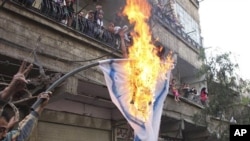The United States on Monday accused Syria of inciting Palestinian unrest along the Israeli-held Golan Heights to divert attention from its violent crackdown on protests. The State Department called it a "cynical" ploy by the beleaguered Damascus government.
U.S. officials say they regret the casualties in Sunday’s clashes between Israeli forces and Palestinian protestors in Lebanon, along the Golan Heights, and in the Gaza Strip and the West Bank.
Crowds of Palestinians, marking the 63rd anniversary of Israel’s founding, tried to force their way across Israel’s northern border with Lebanon and along the dividing line between the Israeli-occupied Golan Heights and Syria.
At least 13 people were killed by Israeli gunfire, including at least three along the Golan boundary, which has been quiet almost the entire time since Israel captured the area in the 1967 Middle East war.
The Golan incident followed a published warning last week by a Syrian businessman with close ties to the Damascus leadership, Rami Makhlouf, that instability for Syria, which has been convulsed by anti-government protests, would mean instability for Israel too.
White House spokesman Jay Carney said it is apparent that the Golan incident was an attempt to distract attention from legitimate protests by the Syrian people.
“We do think that this is an effort by the Syrian government to play a destabilizing role," said State Department Acting Deputy Spokesman Mark Toner. "It’s clearly an effort by them to take the focus off the situation that’s happening right now in Syria. And it’s a cynical use of the Palestinian cause to encourage violence along its border as it continues to repress its own people within Syria.”
Toner spoke after Jordan’s King Abdullah began a Washington visit by meeting with Secretary of State Hillary Clinton, and said that Arab political turmoil notwithstanding, the Israeli-Palestinian conflict remains the “core” problem issue in the region.
Scott Lasensky, a Middle East expert at the United States Institute of Peace, says Syria might be exploiting the situation, but that does not diminish the importance of the Palestinian problem.
“Even if that’s the case, or likely, or a possibility, one should not be so cynical as to dismiss the Palestinian issue as being unimportant," said Lasensky. "It is a very important question; it has been for a long time. It remains the core of the Israeli-Arab dispute. And I think for people who are watching the ‘Arab Spring’ or the 'Arab Awakening,' as some have called it, unfold in these weeks and month, it would be wrong-headed to ascribe the agenda across the Arab world as entirely an internally-driven one.”
Lasensky noted that the violence on the Israel anniversary precedes a major policy speech by U.S. President Barack Obama on the Middle East planned for Thursday.
He cited a “vacuum” in Middle East peace efforts that began last September, when U.S.-brokered peace talks between Israeli and the Palestinians broke down, almost as soon as they were convened by former U.S. Middle East envoy George Mitchell.
Lasenksy said that vacuum is being filled by a unilateral effort by Palestinians to have their prospective state endorsed by the United Nations, and violence on the ground as seen by Sunday’s events.
In his comments here, State Department spokesman Toner said Israel, like any other country, has a right to secure its borders. But he appealed for restraint by all sides, while commending Palestinian security forces for helping keep order in the West Bank.




